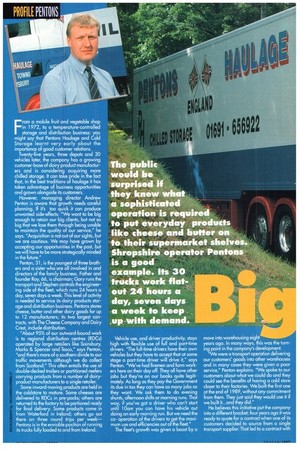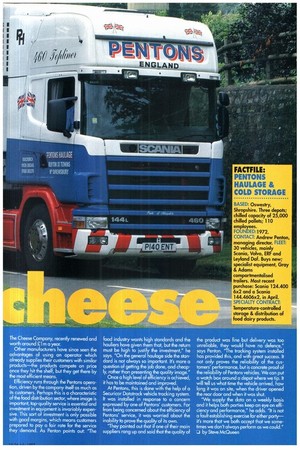111
Page 40

Page 41

If you've noticed an error in this article please click here to report it so we can fix it.
%AO
mania
01691' 656911 From a mobile fruit and vegetable shop in 1972, to a temperature-controlled storage and distribution business: you might say that Pentons Haulage and Cold Storage learnt very early about the importance of good customer relations.
Twenty-five years, three depots and 30 vehicles later, the company has a growing customer-base of dairy product manufacturers and is considering acquiring more chilled storage. It can take pride in the fact that, in the best traditions of haulage it has taken advantage of business opportunities and grown alongside its customers. However, managing director Andrew Penton is aware that growth needs careful planning. If it's too quick it can produce unwanted side-effects: "We want to be big enough to retain our big clients, but not so big that we lose them through being unable to maintain the quality of our service," he says. "Acquisition is not out of our sights, but we are cautious. We may have grown by accepting our opportunities in the past, but we will have to be more strategically minded in the future."
Penton, 31, is the youngest of three brothers and a sister who are all involved in and directors of the family business. Father and founder Roy, 66, is chairman; Gary runs the transport and Stephen controls the engineering side of the fleet, which runs 24 hours a day, seven days a week. This level of activity is needed to service its dairy products storage and distribution business. Pentons stores cheese, butter and other dairy goods for up to 12 manufacturers; its two largest contracts, with The Cheese Company and Dairy Crest, include distribution.
"About 95% of our outward-bound work is to regional distribution centres (RDCs) operated by large retailers like Sainsbury, Marks & Spencer and Tesco," says Penton, "and there's more of a southern divide to our traffic movements although we do collect from Scotland." This often entails the use of double-decked trailers or partitioned reefers carrying products from a number of dairyproc uct manufacturers to a single retailer. Some inward-moving products are held in the coldstore to mature, Some cheeses are delivered to RDCs in pre-packs; others are returned to the factory to be portioned ready for final delivery. Some products come in From Waterford in Ireland; others go out ere on three round trips per weekPentons is in the enviable position of running its trucks fully loaded to and from Ireland. Vehicle use, and driver productivity, stays high with flexible use of full and part-time drivers. "The full-time drivers have their own vehicles but they have to accept that at some stage a part-time driver will drive it," says Penton. "We've had firemen and farm workers here on their day off. They all have other jobs but they're on our books quite legitimately. As long as they pay the Government its due in tax they can have as many jobs as they want. We ask them to do evening shunts, afternoon shifts or morning runs. That way, if you've got a driver who can't start until 10am you can have his vehicle out doing an early morning run. But we need the cooperation of the drivers to get the maximum use and efficiencies out of the fleet."
The fleet's growth was given a boost by a move into warehousing eight years ago. In many ways, this was the turning point in the company's development. 'We were a transport operation delivering our customers' goods into other warehouses and in many cases they were given a poor service," Penton explains. "We spoke to our customers about what we could do and they could see the benefits of having a cold store closer to their factories. We built the first one at the end of 1989, without any commitment from them. They just said they would use it if we built it...and they did." He believes this initiative put the company into a different bracket; four years ago it was ready to quote for a contract when one of its customers decided to source from a single transport supplier. That led to a contract with
The Cheese Company, recently renewed and worth around El ma year.
Other manufacturers have since seen the advantages of using an operator which already supplies their customers with similar products—the products compete on price once they hit the shelf, but they get there by the most efficient means.
Efficiency runs through the Pentons operation, driven by the company itself as much as its customers. Perhaps this is a characteristic of the food distribution sector, where image is important, top-quality service is essential and investment in equipment is invariably expensive. This sort of investment is only possible with good margins, which means customers prepared to pay a fair rate for the service they demand. As Penton points out: "The food industry wants high standards and the hauliers have given them that, but the return must be high to justify the investment," he says. "On the general haulage side the standard is not always so important. It's more a question of getting the job done, and cheaply, rather than presenting the quality image." Once a high level of efficiency is achieved, it has to be maintained and improved. At Pentons, this is done with the help of a Securicor Datatrack vehicle tracking system. It was installed in response to a concern expressed by one of Pentons' customers. For from being concerned about the efficiency of Pentons' service, it was worried about the inability to prove the quality of its own. "They pointed out that it one of their main suppliers rang up and said that the quality of
the product was fine but delivery was too unreliable, they would have no 'defence," says Penton. "The tracking system installed has provided this, and with great success. It not only proves the reliability of the customers' performance, but is concrete proof of the reliability of Pentons vehicles. We can put a watch box around a depot where we tip. It will tell us what time the vehicle arrived, how long it was on site, when the driver opened the rear door and when it was shut.
"We supply the data on a weekly basis and it helps both parties keep an eye on efficiency and performance," he adds. "It is not a fault establishing exercise for either party— it's more that we both accept that we sometimes we don't always perform as we could." =I by Steve McQueen








































































































